The island of Cuba was inhabited by various Native American cultures prior to the arrival of the explorer Christopher Columbus in 1492. After his arrival, Spain conquered Cuba and appointed Spanish governors to rule in Havana. The administrators in Cuba were subject to the Viceroy of New Spain and the local authorities in Hispaniola. In 1762–63, Havana was briefly occupied by Britain, before being returned to Spain in exchange for Florida. A series of rebellions between 1868 and 1898, led by General Máximo Gómez, failed to end Spanish rule and claimed the lives of 49,000 Cuban guerrillas and 126,000 Spanish soldiers. However, the Spanish–American War resulted in a Spanish withdrawal from the island in 1898, and following three and a half years of subsequent US military rule, Cuba gained formal independence in 1902.
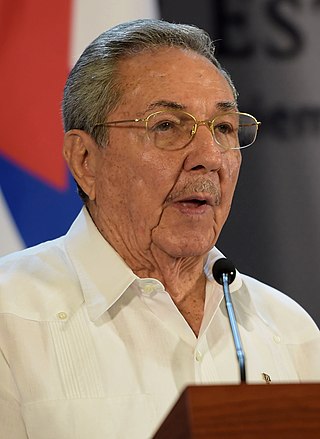
Raúl Modesto Castro Ruz is a Cuban retired politician and general who served as the first secretary of the Communist Party of Cuba, the most senior position in the one-party communist state, from 2011 to 2021, and President of Cuba between 2008 and 2018, succeeding his brother Fidel Castro.
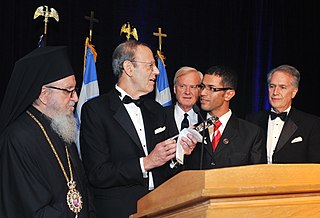
The National Endowment for Democracy (NED) is a quasi-autonomous non-governmental organization in the United States founded in 1983 with the stated aim of advancing democracy worldwide, by promoting political and economic institutions, such as political groups, trade unions, free markets, and business groups.
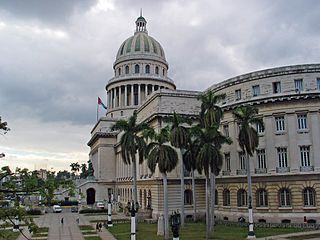
The United States embargo against Cuba has prevented U.S. businesses from conducting trade or commerce with Cuban interests since 1958. Modern diplomatic relations are cold, stemming from historic conflict and divergent political ideologies. U.S. economic sanctions against Cuba are comprehensive and impact all sectors of the Cuban economy. It is the most enduring trade embargo in modern history.

The Cuban dissident movement is a political movement in Cuba whose aim is to replace the current government with a liberal democracy. According to Human Rights Watch, the Marxist-Leninist Cuban government represses nearly all forms of political dissent.

Elections in Cuba are held at municipal, provincial, and national levels. Cuba is a one-party state, with the Communist Party of Cuba being described as the "superior driving force of the society and the state" in the Constitution of Cuba, and the communist party is the only official political party. Elections in Cuba are not considered democratic because the government does not allow free and fair voting.

Cuba, officially the Republic of Cuba, is an island country, comprising the island of Cuba, Isla de la Juventud, and 4,195 islands, islets and cays surrounding the main island. It is located where the northern Caribbean Sea, Gulf of Mexico, and Atlantic Ocean meet. Cuba is located east of the Yucatán Peninsula (Mexico), south of both Florida and the Bahamas, west of Hispaniola, and north of Jamaica and the Cayman Islands. Havana is the largest city and capital. Cuba is the third-most populous country in the Caribbean after Haiti and the Dominican Republic, with about 10 million inhabitants. It is the largest country in the Caribbean by area.

Modern diplomatic relations between Cuba and the United States are cold, stemming from historic conflict and divergent political ideologies. The two nations restored diplomatic relations on July 20, 2015, after relations had been severed in 1961 during the Cold War. The U.S. has maintained a comprehensive trade embargo against Cuba since 1958. The embargo includes restrictions on all commercial, economic, and financial activity, making it illegal for U.S. corporations to do business with Cuba.

The Center for a Free Cuba is a Washington, DC-based organization. It states that it is "an independent, non-partisan institution dedicated to promoting human rights and a transition to democracy and the rule of law on the island. Established in November 1997, the center gathers and disseminates information about Cuba and Cubans to the media, non-governmental organizations, and the international community. The center also assists the people of Cuba through its information outreach and humanitarian programs on the island."
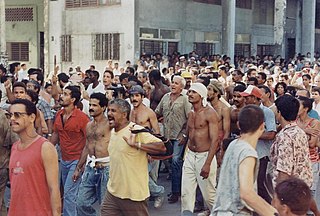
The Maleconazo was a protest on 5 August 1994, in which thousands of Cubans took to the streets around the Malecón in Havana to demand freedom and express frustration with the government. Following the collapse of the Soviet Union in the early 1990s, Cuba fell into a crippling economic crisis that had many citizens looking to flee the island. On the day of the protest, the Cuban police blocked people from boarding tugboats leaving Havana, prompting thousands of citizens to storm the streets in the largest anti-government demonstration Cuba had seen since the Cuban Revolution. In the following weeks, President Fidel Castro quelled the frustration by opening the doors of the country and allowing Cubans to leave, which had a significant impact on Cuba's relationship with the United States moving forward.

Miguel Díaz-Canel Bermúdez is a Cuban politician and engineer. He has served as the 8th First Secretary of the Communist Party of Cuba since 2021 and as the 17th President of Cuba since 2019. In his capacity as First Secretary he is the most powerful person in the Cuban government.

An ongoing socioeconomic and political crisis began in Venezuela during the presidency of Hugo Chávez and has worsened during the presidency of successor Nicolás Maduro. It has been marked by hyperinflation, escalating starvation, disease, crime and mortality rates, resulting in massive emigration.
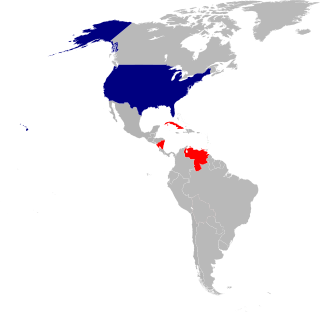
Troika of tyranny is a description of the nations of Cuba, Nicaragua and Venezuela used by United States National Security Advisor John R. Bolton in outlining United States foreign policy towards those nations. Bolton has alternately described the three countries as the "triangle of terror" and the "three stooges of socialism", stating that the three are "the cause of immense human suffering, the impetus of enormous regional instability, and the genesis of a sordid cradle of communism in the western hemisphere".

Nationwide recurring electrical blackouts in Venezuela began in March 2019. Experts and state-run Corpoelec sources attribute the electricity shortages to lack of maintenance and to a lack of technical expertise in the country resulting from a brain drain. Nicolás Maduro's administration attributes them to sabotage. Since March, various nationwide blackouts occurred in the country.

During the crisis in Venezuela, the United States applied sanctions against specific Venezuelan government entities and individuals associated with the administration of Nicolás Maduro, along with sanctions applied by the European Union (E.U.), Canada, Mexico, Panama and Switzerland. By September 2019, the Center for Strategic and International Studies said 119 Venezuelans had been sanctioned by the U.S. and several other countries.
The foreign policy of the Joe Biden administration emphasizes the repair of the United States' alliances, which Biden argues were damaged during the Trump administration. The administration's goal is to restore the United States to a "position of trusted leadership" among global democracies in order to address challenges posed by Russia and China. Both Biden and his Secretary of Defense Lloyd Austin have repeatedly emphasized that no other world power should be able to surpass the United States, either militarily or economically. Biden's foreign policy has been described as having ideological underpinnings in mid-twentieth century liberal internationalism, American exceptionalism, and pragmatism.
The San Isidro Movement is a group of Cuban artists, journalists and academics formed in 2018 to protest against the government's increased censorship of artistic expression in Cuba. The group's members have staged protests, performances and interventions that have resulted in arrests and retaliatory actions by the Cuban government.

A series of protests against the Cuban government and the Communist Party of Cuba began on 11 July 2021, triggered by a shortage of food and medicine and the government's response to the resurgent COVID-19 pandemic in Cuba. The protests were the largest anti-government demonstrations since the Maleconazo in 1994. Protesters' motivations included resentment at the Cuban government's authoritarianism and curbs on civil liberties, the government's COVID-19 pandemic lockdown rules, and failure to fulfill their promised economic and political reforms. The poor state of the Cuban economy also called for major protests all over the country. Cuban dissidents have placed the responsibility for these problems on the government's economic policies and abuse of human rights.
This article covers events in the year 2024 in Cuba.
The political history of North America in the 2020s covers political events on the continent, other than elections, from 2020 onwards.













